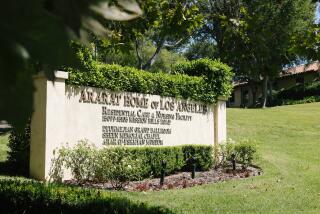Medical Centers Warned Over Lapses
Two Southern California hospitals have been told that they could lose their accreditation because of medical lapses, regulators said Wednesday.
The Joint Commission on Accreditation of Healthcare Organizations warned City of Angels Medical Center near downtown Los Angeles and Kindred Hospital in La Mirada after both facilities failed to meet standards during inspections late last year. Both hospitals have filed appeals, and the commission is expected to make a final decision by May.
The commissionâs seal of approval has both symbolic and practical significance: Many insurance companies require it in their contracts.
Less than 1% of the thousands of laboratories and hospitals nationwide that are inspected every few years perform so poorly that they receive such threats to pull the agencyâs accreditation, said Mark Forstneger, a spokesman for the agency.
Four of the 18 hospitals put on the warning list in the last two years are in Los Angeles County -- a fact that puzzles some officials. Last year, both East Los Angeles Doctors Hospital and Martin Luther King Jr./Drew Medical Center received such warnings. King/Drew lost its accreditation; East Los Angeles is still in the appeals process.
Los Angeles County does seem to have a disproportionate share of problems, Forstneger said, but it is unclear whether the accreditation warnings are simply a fluke or suggest something more serious.
âIt just seems like a random cluster,â he said. âThe same evaluation methods are used whether youâre on the East Coast or West Coast.â
The other hospitals whose accreditations have been threatened this year include Alta Bates Summit Medical Center in Berkeley, Greater Hazleton Health Alliance in Hazleton, Pa., the Methodist Hospitals in Gary, Ind., and Roseland Community Hospital in Chicago.
King/Drew was cited for problems in several parts of the hospital. East Los Angeles Doctors Hospital as well as City of Angels and Kindred were faulted for problems in their labs. Surveyors gave the pathology and clinical laboratory services at City of Angels failing marks for 15 standards, including maintaining and testing laboratory equipment, making sure technicians devise and use reliable tests, and setting a protocol for evaluating bad reactions to blood transfusions.
At Kindred, the pathology and clinical laboratory services failed in 16 areas, such as complying with all applicable laws and regulation, communicating effectively throughout the laboratory, providing current descriptions and instructions for methods, and storing blood properly.
Documents provided by the accreditors did not say whether any of the alleged errors resulted in patients being harmed. But Forstneger said accurate lab results are crucial in the practice of medicine and that serious lapses in the labs are enough to put an entire hospitalâs accreditation in jeopardy.
A spokeswoman for City of Angels, Jodi P. Berlin, emphasized that the Joint Commissionâs allegations concern only laboratory services at the hospital, which is licensed for 117 acute-care beds and 70 psychiatric beds.
âCity of Angels Medical Center takes great pride in its [Joint Commission] accreditation, which it has maintained since the hospital began operations, and on its ability to provide quality patient care,â she said in an e-mailed statement.
Officials at Kindred Hospital La Mirada, which consists of three campuses in La Mirada, Santa Ana and West Covina with a total of about 250 beds, stressed the hospitalâs continued commitment to quality care.
âWe take seriously any issue brought to our attention,â said Chief Operating Officer Robin G. Rapp, in a written statement. âWe are actively communicating with [the Joint Commission] regarding their findings.â
Jim Lott, a spokesman for the Hospital Assn. of Southern California, said he was not sure why laboratories have lately caused so many accreditation problems.
âWe hear things like, âWeâve got lab technicians or pharmacists in short supply,â â he said. âThat places a strain on hospitals, but I donât hear that the problems are so severe that [they affect] the quality of the service coming out of the laboratory or pathology.â
Lott said the accrediting agency has been more visible since a 2004 report to Congress by the Government Accountability Office criticized the Joint Commission for being too lax.
âThey are dotting their Iâs and crossing their Ts, more so than before the criticism,â Lott said. âI donât know that thereâs been any hue and cry in the [hospital] industry about them being bad or being too tough.â
But Lott said some hospitals have complained that the inspectors who visit donât always apply consistent measuring standards. âA lot of hospitals have discussed or reported capricious behavior on the part of surveyors on applying the standards,â he said.
Accreditors said they revamped some of their inspection standards a few years ago but deny they are being more aggressive now.
The other California hospital on the new list, Alta Bates Summit, has 1,082 beds.
It was cited for 20 deficiencies, including not properly obtaining informed consent in behavioral healthcare units, not assessing pain for all hospital and long-term care residents and not giving the same standards of care to patients with comparable needs.
Like officials at East Los Angeles Doctors Hospital, officials at Alta Bates Summit acknowledged lapses in paperwork, but not in medical care.
For example, said Carolyn Kemp, the hospitalâs director of public affairs, in the case of surveyors faulting the hospital for providing different standards of care, patients were not treated differently; doctors and nurses were just filling out different forms at different campuses.
More to Read
Sign up for Essential California
The most important California stories and recommendations in your inbox every morning.
You may occasionally receive promotional content from the Los Angeles Times.










